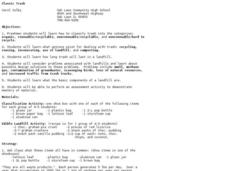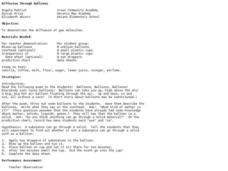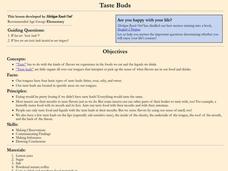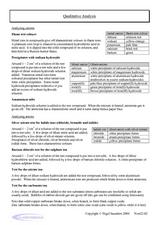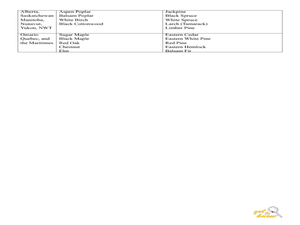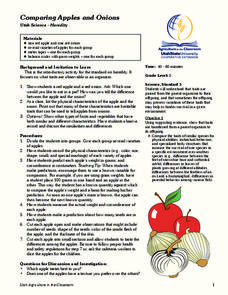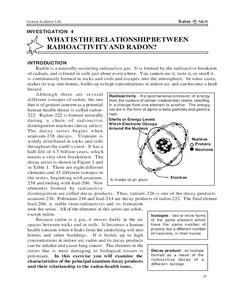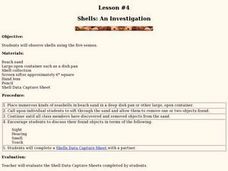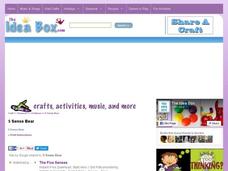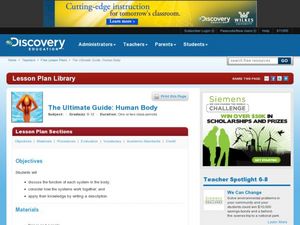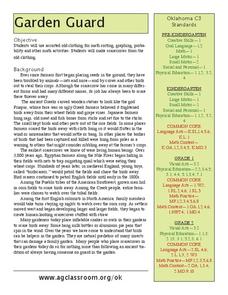Curated OER
Chemical Change vs. Physical Change
In this physical and chemical change worksheet, students are given a description of these changes. They are given ten changes that the students identify as chemical or physical changes based on their reading.
Curated OER
Physical vs. Chemical Changes and "The Code"
In this chemical and physical change worksheet, students read about the differences between substances going through physical changes vs. chemical changes. They are given examples of each and evidence to look for in chemical changes....
Curated OER
Honors-Acid and Base Properties Homework
For this acid and base worksheet, students answer 8 questions about Arrhenius, Bronsted-Lowry, and Lewis bases. They determine Bronsted-Lowry conjugate acid-base pairs and they identify compounds and solutions as acids, bases or neutral.
Curated OER
Acid and Base Homework
In this acid and base worksheet, students answer 7 questions about acidic and basic solutions such as the color each turns litmus paper, the pH values, the balanced equations for neutralization reactions and their pH and concentrations.
Curated OER
Name That Taste
Students analyze taste buds. In this taste activity, students complete an experiment in groups of four people. Students have four cups with a different substance in each cup. One student dips a Q-tip into each cup and tests on another...
Curated OER
The Properties of Air
First graders draw conclusions about the properties of air. In this properties of air lesson, the teacher demonstrates several properties of air and guides students through discovering that air is colorless, tasteless, odorless, exerts...
Curated OER
Classic Trash
Students investigate how trash is classified and the options to deal with it. In this trash and recycling instructional activity, students perform an activity to classify trash into organic, renewable/ recyclable, now...
Curated OER
Diffusion Through Balloons
Students observe the diffusion of air molecules through a balloon. In this chemistry and molecules lesson, students fill balloons with air and a scented substance and observe whether the scented air is able to permeate the balloon.
Curated OER
Our Five Senses
Students use their five senses to describe what's in a mystery bag. In this senses lesson, students use a graphic organizer to collect words for a sensory poem.
Curated OER
Taste Buds
Students investigate taste buds. In this taste buds lesson, students identify the four basic taste buds and their locations on our tongue. Students participate in an experiment to investigate how our taste buds work.
Curated OER
Qualitative Analysis
In this qualitative analysis worksheet, students read about all the different tests that can be done in chemistry to give qualitative results. Tests include flame tests, forming precipitates with sodium hydroxide, using sodium hydroxide...
Curated OER
Get to Know Trees
Students recognize the characteristics of trees by using their five senses. In this trees instructional activity, students observe and record the characteristics of trees on a field trip. Students then are blindfolded and use their...
Curated OER
Microbes and Health
Students participate in activities that show them how tiny germs are spread. In this germs lesson plan, students engage in hands on lessons to show them how microorganisms can easily spread disease through the mouth and hands.
Curated OER
Comparing Apples and Onions
Fifth graders observe and compare apples. In this apples lesson, 5th graders work in groups to record the physical characteristics of a variety of apples. Students predict each apples weight and then weigh them to see if they were...
Curated OER
What is the Relationship Between Radioactivity and Radon?
In this radon and radioactivity worksheet, students analyze the data of the isotopes of elements that occur in the decay series of uranium-238. Students answer 6 questions about the isotopes, their half-lives, their potential threat and...
Curated OER
Those Busy, Buzz'n Worker Bees
Young scholars research information on worker bees. In this insect lesson, students review the body parts of insects and how bees find flowers. They discuss compound and simple eyes and the life cycle of a worker bee.
Curated OER
Shells: An Investigation
Students observe shells using their five senses. In this scientific inquiry lesson, students examine shells using a hand lens and their five senses. Students complete an included shell data sheet.
Curated OER
Review of the Five Senses
Students investigate the five senses. In this human biology lesson plan, students are given five items and identify which items match best with each of the senses. Students use objects such as a rock, hard candy, and a flower.
Curated OER
5 Sense Bear
Students become familiar with their five senses through the creation of a sense bear. In this five senses lesson, students create a bear and add cinnamon and a candy cane to the bear. Students use their five senses with this bear...
Curated OER
Mollusks
In this mollusks worksheet, students color several figures and label them with the correct parts. They complete 14 short answer questions related to mollusks.
Curated OER
The Ultimate Guide: Human Body
Students study the body systems and their functions. In this human body lesson students research the Internet on body systems and write a description of them.
Curated OER
Blue Planet: Tidal Seas
Young scholars investigate how tides affect sea life. In this video based lesson plan, students view a video on how tides affect sea life. They do web-based research to find the answers to a series of questions and then play Tidal Trivia...
Curated OER
Garden Guard
Students read about the history of farming with the use of scarecrows and then sort clothing, build scarecrows, write descriptions, and more. In this scarecrows lesson plan, students also play a game called Garden Tag.
Curated OER
Primary Lessons for Grades K-2
Students study wildlife and identify similarities and differences between their home and wild environments. In this wildlife lesson plan, students make connections between wildlife and wildlife habitats. Students then build knowledge...








